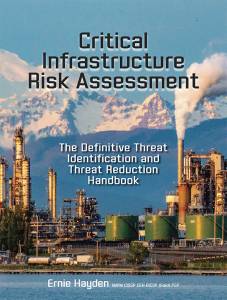Taking Time for Observations
by Ernie Hayden MIPM CISSP CEH GICSP(Gold) PSP
In the 1982 book, In Search of Excellence, the authors – Thomas Peters and Robert Waterman – coined the phrase, “MBWA – Management by Walking Around.” By MBWA, what they intended is that good managers spend time out of their office and observing their operations. They took this action in order to keep in touch with the firm’s essential business. Over my years of technical management and consulting, I’ve found this to be an unbelievably valuable principle to follow. Taking time for observations can make you start questioning current critical infrastructure activities and processes.
For example, how many times have you heard news about activities in your organization that are a surprise? How many times have you been asked how a process works? How many times have you had to cite a statistic but weren’t sure where it came from? Believe it or not, going out and observing your company and its activities will help you stay more “on your toes” than “flat footed” when these questions arise.
There are three kinds of men. The one that learns by reading.
The few who learn by observation. The rest of them have to pee on the electric fence for themselves.
– Will Rogers
https://www.brainyquote.com/topics/observation-quotes
Let’s take a simple example. Describe the flow of incoming materials into your facility. How are they received, inspected, inventoried, and entered into your Enterprise Resource Planning (ERP) database? It may see unimportant or even “silly,” but by understanding this process you are further ahead than most executives in any company.
How about another. Describe your company’s core product and how it is built and delivered to the customer? This can be a true “brick and mortar” item or a “knowledge product.” What is the process for design and quality assurance? How can the customer provide feedback on the product’s quality?
Lastly, have you ever spent time watching an employee do their job? Watched the receptionist in the lobby or watched the janitor clean the offices after hours? Believe it or not there are so many benefits to taking time for these observations. Not only do you better understand their jobs, but you also give the employee a better sense that you actually care about their contribution to the company. The receptionist is an especially important observation since they are the first impression offered to visitors and delivery persons.
The Power of Observations
To acquire knowledge, one must study; but to acquire wisdom, one must observe.
Marilyn vos Savant
https://www.brainyquote.com/topics/observation-quotes
In my career, I’ve had the opportunity to be trained by some of the best in the business on the “observation process.”
From 1986 to 1993 I worked at the Institute of Nuclear Power Operations (INPO) in Atlanta, Georgia, USA. INPO’s mission is to promote the highest levels of safety and reliability – to promote excellence – in the operation of commercial nuclear power plants.
INPO was formed in 1979 following the Three Mile Island nuclear power plant accident. INPO’s early executives and management team were former US Navy nuclear Navy officers who were hand-picked by Admiral Rickover himself. Rickover’s no-nonsense approach to management and leadership was inscribed in the philosophies of these leaders at INPO.
One influence from the Navy Nuclear program was the concept of “Observations.” Essentially an Observation is a formalized way to collect information and facts as you review documents, watch personnel do work, inspect physical plants and facilities, survey warehouses, and scrutinize the operation of an office, plant, or company. Not only is there a product of these reviews – an “Observation,” but there is the process of performing the observation that helps the observer better understand how the company/office/facility operates and runs.
Additionally, performing the observation causes the observer to become a better critical thinker. As you are watching the work or reviewing the process you are constantly asking such questions as: a) WHY is the process being performed in this manner? b) HOW can the process be performed more efficiently? and, c) WHAT are the implications to my customers and other employees if this work is not performed properly and efficiently.
By the way, the conduct of the observation is a more formalized way of MBWA.
The Observation Process
The observation may be a simple set of notes or it can be a formalized report. In either case, the most effective aspect of an observation is that it results in improvement or added excellence to the performance of your company’s performance.
To Learn More
If you find this intriguing, please download the sample chapter from my book, “Chapter 5, The Power of the Observation.” You can get it at https://www.rothstein.com/product/free-chapter-critical-infrastructure-risk-assessment/
Ernie Hayden MIPM, CISSP, CEH, GICSP(Gold), PSP, is author of the new book, Critical Infrastructure Risk Assessment: The Definitive Threat Identification and Threat Reduction Handbook.
